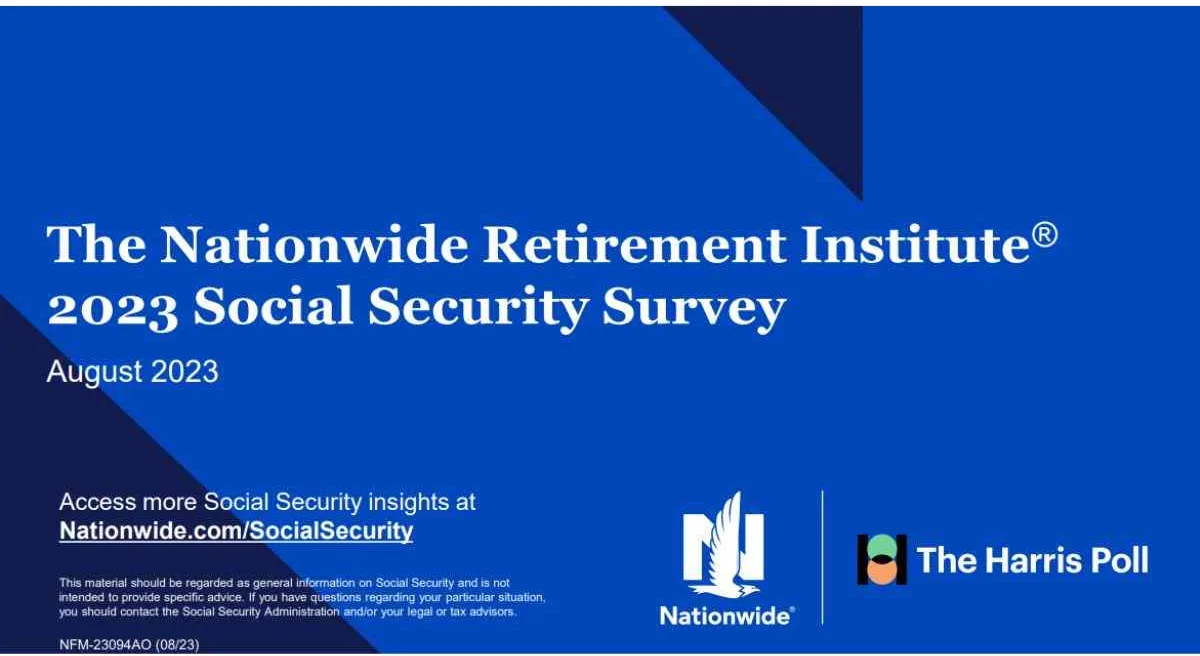Americans’ Social Security Misconceptions Revealed!
Social Security, an institution with nearly a century of history, touches the lives of approximately 66 million Americans.
Yet, despite its widespread impact, a new survey by the Nationwide Retirement Institute has unveiled some startling misconceptions about Social Security. Find the survey report HERE.

Here are the key takeaways from the survey, shedding light on the areas where most Americans are getting it wrong.
Misconception #1: Taxing All Income
The Myth: Workers must pay Social Security taxes on all of their income.
In the survey, which engaged 1,806 U.S. adults aged 18 and older, a significant misconception surfaced.
A staggering 74% of respondents believed that workers were obligated to pay Social Security taxes on their entire income.

While it’s true that many do pay Social Security payroll taxes on all their earnings, there’s a crucial exception.
The taxable maximum, also known as the contribution and benefit base, currently stands at $160,200 for 2023. Income beyond this threshold is exempt from Social Security payroll taxes.
Misconception #2: No Second Chances
The Myth: Once you claim Social Security benefits, there’s no turning back.
Choosing the right time to claim Social Security benefits is a critical decision for those nearing retirement.
The survey found that 71% of respondents answered “false” to the statement, “You can undo a claiming decision within the first 12 months.”
Contrary to this belief, the Social Security Administration does allow individuals to cancel or withdraw their benefits applications within a 12-month period after approval.
Any benefits received during that time must be repaid. However, this “do-over” opportunity is a one-time option that could prove invaluable for those who have second thoughts after initiating their benefits.
Misconception #3: The Inflation Shield
The Myth: Social Security benefits are not protected against inflation.
Perhaps one of the most surprising findings of the Nationwide survey was that approximately 70% of respondents didn’t believe that Social Security benefits are safeguarded against inflation.

In reality, Social Security recipients receive an annual cost-of-living adjustment (COLA) specifically designed to counteract the eroding effects of inflation.
For instance, when inflation surged recently, beneficiaries received a significant 8.7% COLA increase to mitigate the impact of rising living costs.
However, there is an ongoing debate about whether this inflation protection is entirely sufficient, with some experts arguing that the inflation metric used may not accurately reflect seniors’ cost increases.
Additional Misconception: Earnings Vanished
The Myth: “I will not get a dime of the Social Security benefits I have earned.”
Beyond the 21 general knowledge questions, the survey also revealed another misconception: 24% of respondents agreed with the statement, “I will not get a dime of the Social Security benefits. However, it’s important to note that even in such a scenario, ongoing payroll taxes can still fund most of the scheduled Social Security benefits.
Additionally, potential benefit cuts are not set in stone, as Congress and the president have various options to secure Social Security’s future.
Uncertain Outlook
In an era where the future feels more unpredictable than ever, the specter of financial security in retirement looms large.
A recent survey unveiled a startling statistic – a mere 46% of respondents expressed faith in their government’s commitment to safeguard their retirement finances.
This revelation underscores a growing sense of unease among the populace, as concerns about the stability of Social Security persist.
The fate of Social Security remains a subject of widespread speculation. Will it endure, providing a safety net for generations to come? Or will it falter under the weight of demographic shifts and fiscal pressures? Only time will unveil the answers to these questions.
In the meantime, the prudent among us recognize the importance of taking proactive steps to secure our own financial futures.
Whether through diligent saving, wise investments, or exploring alternative retirement options, the responsibility ultimately rests with us.
While uncertainty may cloud the horizon, our determination to forge a secure retirement can be a guiding light in these uncertain times.
Summary
In the ever-evolving landscape of retirement planning, knowledge is indeed power. The recent findings from the Nationwide Retirement Institute’s comprehensive survey have shone a spotlight on a pressing issue – the widespread misunderstandings that plague Americans when it comes to Social Security.
One of the most glaring misconceptions is related to tax thresholds. Many believe that Social Security benefits are entirely tax-free, but in reality, they can be subject to taxation depending on your overall income.
This is a critical detail to grasp for anyone navigating the complex web of retirement finances.
Furthermore, the ability to change claiming decisions is another aspect often muddled in confusion. Understanding the flexibility to adjust your claiming strategy can have a profound impact on your financial well-being during retirement.
Lastly, the survey highlights the misunderstanding surrounding Social Security’s inflation protection.
As the cost of living continues to rise, comprehending how your benefits adapt to inflation can be a game-changer.
In conclusion, these revelations underscore the necessity of dispelling these myths and misconceptions. To secure a stable and comfortable retirement, gaining a clear understanding of these nuances is not just beneficial—it’s absolutely vital.
Whether you’re nearing retirement age or planning for the future, arming yourself with accurate information about Social Security can pave the way for a more secure financial future.






